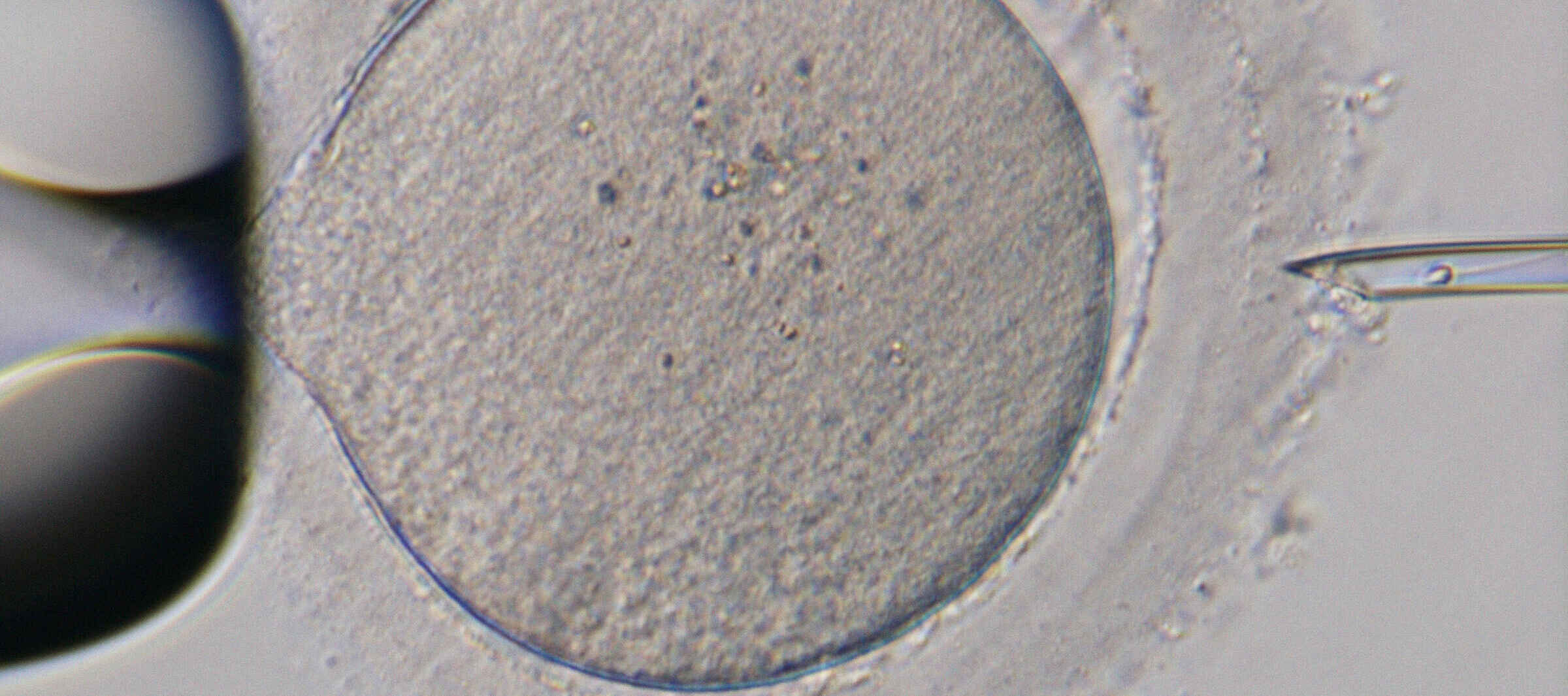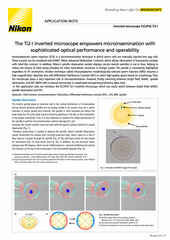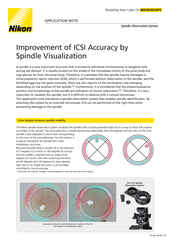- en Change Region
- Global Site
- Home
- Applications
- Clinical Research
- Assisted Reproductive Technology (ART)
Assisted Reproductive Technology (ART)

Assisted reproduction techniques (ART) include in vitro fertilization (IVF)-related procedures such as conventional IVF, where egg and sperm are combined in a dish and fertilization takes place without injection, intracytoplasmic sperm injection (ICSI), and intracytoplasmic morphologically selected sperm injection (IMSI). Injection via ICSI/IMSI is performed using micromanipulators mounted directly above the stage of an inverted microscope.
Products for Assisted Reproductive Technology (ART)
The ECLIPSE Ti2-I and ECLIPSE Ti2-U IVF inverted microscope is suited towards ART applications, featuring a stable frame compatible with a range of micromanipulators made by third party manufacturers.
The ECLIPSE Ti2-I allows the microscope settings to be automatically controlled via simple buttons and a touch screen close to your hands - it has improved efficiency by reducing the steps required for operation by approximately 75%. An alert function and bright, clear field of view support accurate operation.
The Ti2-U IVF also features a laser-safe design compatible with various laser-based system devices designed for ART-related applications. Intermediate magnification can be applied in the microscope body (1.5X and 2.0X available), allowing for detailed imaging with low magnification objectives. For example, 300X total magnification can be achieved using standard 10X eyepieces, 1.5X intermediate magnification, and a 20X objective lens. Both LED and halogen illumination options are available for the Ti2-U IVF.
●: included, ⚬: option
| ECLIPSE Ti2-U IVF Inverted Microscope |
ECLIPSE Ti2-I Inverted Microscope |
|
|---|---|---|
| Micromanipulator Compatibility | yes | yes |
| Camera Integration | yes | yes |
| Illumination Source | LED or Halogen | LED |
| Thermal Control Availability | yes | yes |
| Light Intensity Management (LIM) function | no | yes |
| Compatible Contrasting Techniques | ECLIPSE Ti2-U IVF | ECLIPSE Ti2-I |
| Spindle Observation | yes | yes |
| Differential Interference Contrast (DIC) | yes | yes |
| Nikon Advanced Modulation Contrast (NAMC) | yes | yes |
| Oblique Illumination | no | no |
| Phase Contrast | yes | yes |
| Observation Mode Switching | manual | motorized |
Related Literature
Discussion of Assisted Reproductive Technology (ART)
Challenges with imaging oocytes and embryos
Image courtesy of: The Ronald O. Perelman and Claudia Cohen Center for Reproductive Medicine
Oocytes are thick cells and usually kept in culture vessels with thick plastic bottoms, such as petri dishes. This makes selection of an appropriate objective lens somewhat challenging as users will require both longer working distance and a high NA (for high resolution imaging).
Culture vessels are not only thick but have a different refractive index than air. The selected objective lens will ideally provide spherical aberration correction accounting for the vessel. Many objectives feature a correction collar for adjustable aberration correction.
Many of Nikon’s NAMC objective lenses, as well our 100X objective for IMSI, feature long working distances, correction collars, and maintain relatively high NA without immersion.
Contrasting Techniques for ICSI/IMSI
Phase contrast image of sperm from a motility assay
View of an oocyte using Nikon’s spindle observation system. The meiotic spindle is visible in cyan within the bottom-left portion of the cell
Image courtesy of: Reproduction Clinic Tokyo
There are many contrasting techniques beyond standard brightfield microscopy, each with their own balance of benefits and restrictions. Not all contrasting techniques are suitable for use with ICSI/IMSI.
One of the major challenges is the culture vessel itself, which is generally made of plastic rather than glass. The polarization state of light traveling through plastic is not well maintained, precluding the use of polarization techniques such as polarized light microscopy and differential interference contrast (DIC).
Nikon advanced modulation contrast (NAMC) objective lenses utilize oblique illumination and an amplitude modulator in the detection optics to bias for diffracted light over zero-order light, improving contrast over oblique illumination alone.
Phase contrast is a widespread and useful technique for thin specimens, such as imaging sperm as part of a motility assay. However, it is limited by the halo artifact when imaging thicker specimens, such as oocytes and blastocysts.
Spindle observation is a specialized polarized light technique that optically stains the meiotic spindle in oocytes, making it appear in a cyan or red hue. The relative size of the spindle has been shown to correlate with the success of fertilization by ICSI and subsequent blastocyst formation and clinical pregnancy rates1.
1. Tomari H, Honjo K, Kunitake K, et al. Meiotic spindle size is a strong indicator of human oocyte quality. Reprod Med Biol. 2018. 17(3): 268-274. doi:10.1002/rmb2.12100
Environmental control for sensitive cells
Example of a sample warmer for maintaining sample temperature.
Oocytes, sperm cells, and blastocysts are sensitive to changes in environmental conditions. For this reason, a heating plate or similar apparatus is used to maintain the appropriate temperature – both on the microscope stage and in any sample holding areas.
Further Information on Assisted Reproduction Technology and Microscopy
If you would like to learn more about Nikon solutions for applications such as ICSI/IMSI, we invite you to download our brochure.
Glossary
- Camera Integration
- Nikon provides a variety of camera options, including fast color and monochrome CMOS options.
- Differential Interference Contrast (DIC)
- DIC provides the greatest resolution and optical sectioning performance of the techniques listed here but is not compatible with plastic vessels. DIC is thus useful for fine morphological assessment of sperm for IMSI.
- Illumination Source
- Illumination sources for transmitted light-based contrast techniques are most often either light emitting diodes (LEDs) or halogen lamps. LEDs are a bright, eco-friendly, and more energy efficient choice.
- Micromanipulator Compatibility
- Micromanipulation is critical for control and positioning of micropipettes.
- Nikon Advanced Modulation Contrast (NAMC)
- NAMC and related modulation contrast techniques combine oblique illumination with modulation of the collected light to bias for the detection of diffracted light, which further improves contrast.
- Oblique Illumination
- Oblique illumination techniques rely upon illumination at an oblique angle to provide relief-like contrast. There are many variations of this technique and most are compatible with plastic vessels.
- Phase Contrast
- Phase contrast is a contrasting technique often used for imaging thin and relatively transparent samples, such as cell cultures, and compatible with plastic vessels. It is applied to sperm motility assays and similar applications.
- Spindle Observation
- Spindle observation is a polarized light microscopy technique that allows for visualization of the meiotic spindle with color contrast. It is not compatible with plastic vessels.
- Thermal Control Availability
- Temperature regulation is important for cell health. Nikon offers a variety of both stage-top and holding area thermal regulators from Tokai Hit.
- Home
- Applications
- Clinical Research
- Assisted Reproductive Technology (ART)


